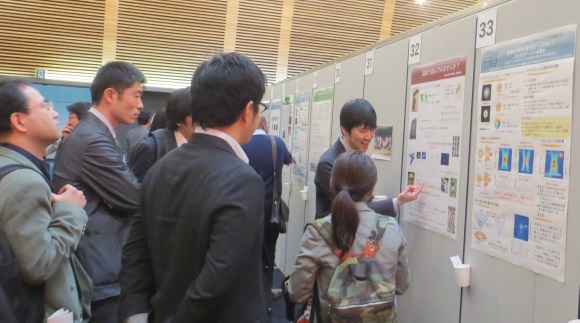2014年度年次報告会(2015年4月16日/Stefan Gruber)
The 2014 Annual Report Meeting of the Hakubi Center was held at Shiran-Kaikan on 16 April 2015. The theme of‘Serving People through Research’highlighted the increasingly important role of researchers in finding answers to today’s most pressing problems. As worldwide development, globalisation and technological advancement accelerate, humankind faces an increasing number of large-scale challenges that threaten order within societies as well as health, security, and even its own survival. Due to the complexity of such phenomena, the role of researchers in finding solutions, particularly through interdisciplinary work, has become increasingly important. It is crucial that researchers reach out to society and fulfil their duty to serve people by exploring solutions, promoting coexistence between populations, and working towards a sustainable future for all humankind.
The speakers at the research meeting were selected in this spirit to demonstrate how they as Hakubi researchers are contributing to the achievement of these aims. In his presentation entitled “Community-based Medical Activities for the Elderly in Bhutan”, SAKAMOTO Ryota gave insight into his fieldwork in Bhutan, where he produced cutting-edge research in a very new field that contributes to the improvement of the lives of the local population and encourages the development of a more healthy, just and sustainable society. TOKINAGA Hiroki presented on “Dealing with Climate Change” and Silvia CROYDON on “Human Rights in Academia: Not Just a Talking Shop”.
As in recent years, each Hakubi researcher was asked to prepare a poster presentation to explain his or her current research project, methodology, findings, and research goals. For the first time, prizes were awarded for the best poster presentations and all attendees were asked to participate in the voting. NISHIMURA Kanehiro (2nd batch) won the prize in the field of Humanities, KOBAYASHI Kei (4th) and HOSO Masaki (4th) in Natural Sciences, Knut WOLTJEN (4th) in Medicine, and Stefan GRUBER (5th) and KHOHCHAHAR Erdenchuluu (4th) in the field of Social Sciences.
In his keynote speech entitled “Learning from Mistakes,” OHNO Terufumi, a leading palaeontologist and director of the Kyoto University Museum, asked: Why do people make mistakes? Are all mistakes equally bad? He also explored the importance of our ability to engage in dialogue, which is a rather recently developed capability that requires an advanced stage of intelligence and the ability to handle abstract concepts and understand the feelings of one another. He argued that it is crucial to develop our abilities of dialogue further in order to find answers to the challenges of our time and ensure a better future for humanity. The meeting was followed by a sukiyaki dinner at Tentora attended by the speakers, numerous Hakubi researchers, director MITSUYAMA Masao, program manager HORI Toshitaka, and former director TANAKA Koji.

(しゅてふぁん ぐるーばー)